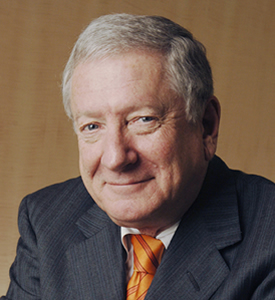
The eminent pharmacologist and biochemist Alfred G. Gilman — a member of NCSE's Advisory Council — died on December 23, 2015, at the age of 74, according to The New York Times (December 24, 2015). Gilman and Martin Rodbell were awarded the Nobel Prize in Physiology or Medicine in 1994 for "their discovery of G-proteins and the role of these proteins in signal transduction in cells." The Times explains that their "research helped scientists understand how the body receives signals and transmits outside stimuli like light and odor, and from a variety of hormones in the body" and also increased understanding of certain types of cancer and hereditary glandular disorders.
Gilman was particularly concerned with attacks on evolution education in his home state of Texas. In 2003, for example, he was active in resisting attempts to undermine the treatment of evolution in the textbooks then under consideration by the Texas state board of education. He wrote a column for the Dallas Morning News, cosigned by sixteen members of the National Academy of Sciences and/or the Institute of Medicine, including three other Nobel laureates, urging the board to "render a decision based solely as whether the texts are scientifically accurate." He subsequently joined NCSE's Advisory Council. In 2008, Gilman was also active in opposing the Institute for Creation Research's application for Texas certification of its graduate school, rhetorically asking the Texas Higher Education Coordinating Board, "How can Texas simultaneously launch a war on cancer and approve educational platforms that submit that the universe is 10,000 years old?" Outside Texas, he signed the petition to repeal Louisiana's so-called Science Education Act. He also frequently helped NCSE to recruit fellow Nobel laureates and members of the National Academy of Sciences to oppose attacks on evolution education in their home states.
Gilman was born on July 1, 1941, in New Haven, Connecticut. He earned his B.S. in biochemistry from Yale University in 1962 and his M.D. and Ph.D. in pharmacology from Case Western Reserve University in 1969. He worked at the University of Virginia from 1971 to 1981, and then at the University of Texas Southwestern Medical Center from 1981 to 2009. He served as the chief scientific officer of the Cancer Prevention and Research Institute of Texas from 2009 to 2012. Besides the Nobel Prize, his honors included membership in the National Academy of Sciences, the American Academy of Arts and Sciences, and honorary degrees from Case Western Reserve, Yale, and the universities of Chicago and Miami.
